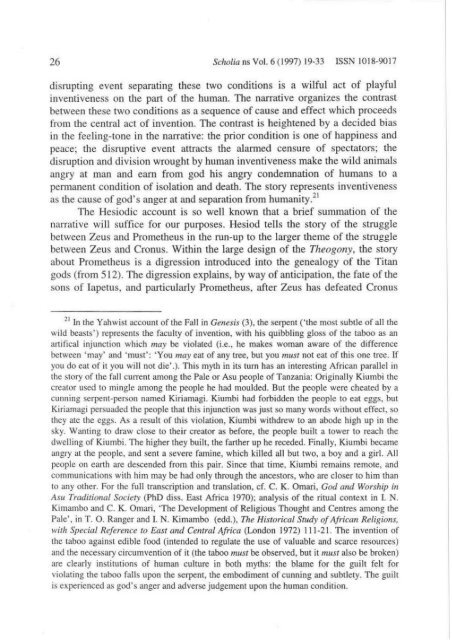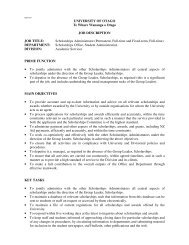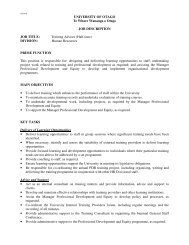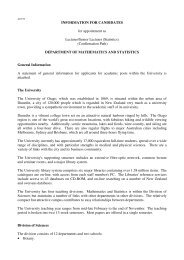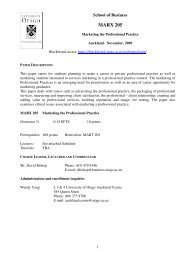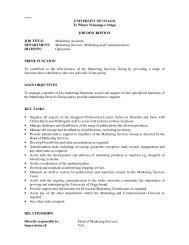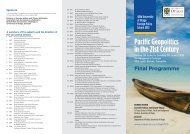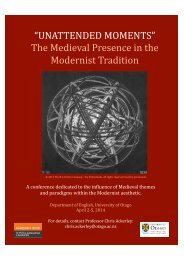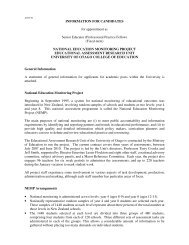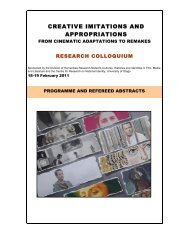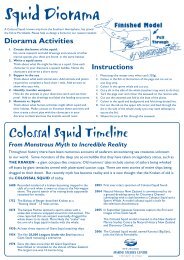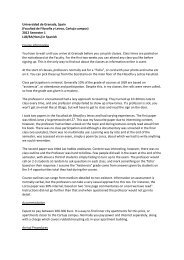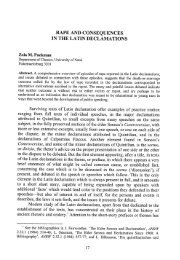scholia - University of Otago
scholia - University of Otago
scholia - University of Otago
You also want an ePaper? Increase the reach of your titles
YUMPU automatically turns print PDFs into web optimized ePapers that Google loves.
26 Scholia ns Vol. 6 (1997) 19-33 ISSN 1018-9017<br />
disrupting event separating these two conditions is a wilful act <strong>of</strong> playful<br />
inventiveness on the part <strong>of</strong> the human. The narrative organizes the contrast<br />
between these two conditions as a sequence <strong>of</strong> cause and effect which proceeds<br />
from the central act <strong>of</strong> invention. The contrast is heightened by a decided bias<br />
in the feeling-tone in the narrative: the prior condition is one <strong>of</strong> happiness and<br />
peace; the di sruptive event attracts the alarmed censure <strong>of</strong> spectators; the<br />
disruption and division wrought by human inventiveness make the wild animals<br />
angry at man and earn from god his angry condemnation <strong>of</strong> humans to a<br />
permanent condition <strong>of</strong> isolation and death. The story represents inventiveness<br />
as the cause <strong>of</strong> god's anger at and separation from humanity? 1<br />
The Hesiodic account is so well known that a brief summation <strong>of</strong> the<br />
narrative will suffice for our purposes. Hesiod tells the story <strong>of</strong> the struggle<br />
between Zeus and Prometheus in the run-up to the larger theme <strong>of</strong> the struggle<br />
between Zeus and Cronus. Within the large design <strong>of</strong> the Theogony, the story<br />
about Prometheus is a digression introduced into the genealogy <strong>of</strong> the Titan<br />
gods (from 512). The digression explains, by way <strong>of</strong> anticipation, the fate <strong>of</strong> the<br />
sons <strong>of</strong> Iapetus, and particularly Prometheus, after Zeus has defeated Cronus<br />
21 In the Yahwist account <strong>of</strong> the Fall in Genesis (3), the serpent ('the most subtle <strong>of</strong> all the<br />
wild beasts') represents the faculty <strong>of</strong> invention, with hjs quibbling gloss <strong>of</strong> the taboo as an<br />
artifical injunction which may be violated (i.e., he makes woman aware <strong>of</strong> the difference<br />
between 'may' and ·must': 'You may eat <strong>of</strong> any tree, but you must not eat <strong>of</strong> this one tree. If<br />
you do eat <strong>of</strong> it you will not die'.). This myth in its turn has an interesting African parallel in<br />
the story <strong>of</strong> the fall current among the Pale or Asu people <strong>of</strong> Tanzania: Originally Kiumbi the<br />
creator used to mingle among the people he had moulded. But the people were cheated by a<br />
cunning serpent-person named Kiriamagi. Klumbi had forbidden the people to eat eggs, but<br />
Kiriamagi persuaded the people that this injunction was just so many words without effect, so<br />
they ate the eggs. As a result <strong>of</strong> this violation, Klumbi withdrew to an abode high up in the<br />
sky. Wanting to draw close to their creator as before, the people built a tower to reach the<br />
dwelling <strong>of</strong> Klumbi. The higher they built, the farther up he receded. Finally, Kiumbi became<br />
angry at the people, and sent a severe famine, which kiJied all but two, a boy and a girl. All<br />
people on eruth arc descended from this pair. Since that time, Klumbi remains remote, and<br />
communications with him may be had only through the ancestors, who are closer to hjm than<br />
to any other. For the full transcription and translation, cf. C. K. Omari, God and Worship in<br />
Asu Traditional Society (PhD diss. East Africa 1970); analysis <strong>of</strong> the ritual context in L N.<br />
Kimambo and C. K. Omari, 'The Development <strong>of</strong> Religious Thought and Centres among the<br />
Pale', in T. 0. Ranger and I. N. Klmambo (edd.), The Historical Study <strong>of</strong> African Religions,<br />
with Special Reference to East and Central Africa (London J 972) 111-21. The invention <strong>of</strong><br />
the taboo against edible food (intended to regulate the use <strong>of</strong> valuable and scarce resources)<br />
and the necessary circumvention <strong>of</strong> it (the taboo must be observed, but it must also be broken)<br />
are clearly institutions <strong>of</strong> human culture in both myths: the blame for the guilt felt for<br />
violating the taboo falls upon the serpent, the embodjment <strong>of</strong> cunning and subtlety. The guilt<br />
is experienced as god's anger and adverse judgement upon the human condition.


